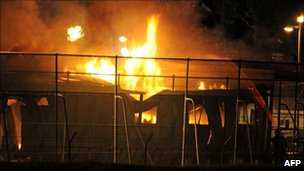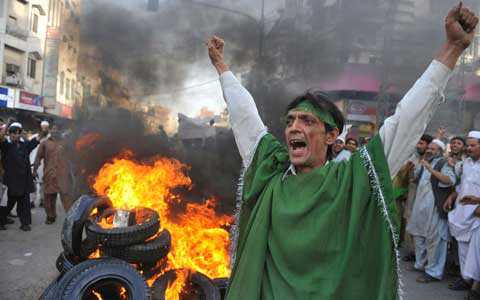
Detainees at an Australian immigration detention centre in Sydney have rioted and burnt down nine buildings.
Rioters at Villawood detention centre threw roof tiles and other objects at firefighters, preventing them from putting out the blazes.
The riot started with a rooftop protest from two detainees and spread to involve 100 people late on Wednesday.
Protests at Australia’s detention centres have become more frequent as the number of asylum seekers has risen.
Immigration Department spokesman Sandi Logan said no injuries had been reported at Villawood.
Riot police had to be called in to restore order after the centre’s unarmed guards retreated in the face of the riot.
“It took some time for the firefighters to be able to gain entry,” he said
“They had had roof tiles and other pieces of furniture being hurled at them by some of the detainees, so it was impossible for them to extinguish the blaze.
“But with the riot squad protection they were able to do that.”
A large gas cylinder exploded and a kitchen, laundry, medical facility and a computer centre were destroyed.
Immigration Minister Chris Bowen said many of those involved in the riot had had applications for asylum rejected.
“These are people, in many instances, who are not happy that they have not been accepted as refugees,” he said.
Villawood detention centre holds both irregular maritime arrivals – people arriving in Australia by boat to seek asylum – and people already on the Australian mainland who have violated their visas or had them cancelled.
Mental health warning
In recent months there have been a number of violent riots, suicides and self-harm attempts at Australian detention centres, says the BBC’s Nick Bryant in Sydney.
Detainees at Villawood have complained of lengthy waits to have their asylum claims heard
There have been complaints from detainees about overcrowding and the length of time it takes to process their applications, our correspondent says.
An increase in the number of asylum seekers arriving by boat – mainly from Sri Lanka, Afghanistan and Iraq – has led to overcrowding at Christmas Island and other detention centres.
There was another riot at Christmas Island last month following a breakout.
Last year, rights group Amnesty International warned that the mental health of some of the asylum seekers held on Christmas Island was deteriorating because of uncertainty over their situation and the conditions in which they were being held.
The Australian government has recently announced the provision of more than 1,900 new beds for asylum seekers to ease crowding in detention centres.
Four hundred beds will be available in Pontville, southern Tasmania, within a month and another 1,500-bed facility at Wickham Point, Darwin, will open in mid-2011.
AUSTRALIA ASYLUM STATISTICS
- Irregular maritime arrivals (IMAs) in 2010: 134 boats carrying 6,535 people
- IMAs up to 19 April 2011: 16 boats carrying 921people
- As of 20 April 4,552 IMAs detained on the mainland, 1,748 on Christmas Island
- Currently 392 detainees in Villawood of whom 172are IMAs
Source: Australian Department of Immigration
BBC
 YEREVAN. – Turkey and Azerbaijan have real problems with national morale and political sufficiency, Armenian Deputy FM Shavarsh Kocharyan stated at the presentation of a book on Armenian-Turkish relations.
YEREVAN. – Turkey and Azerbaijan have real problems with national morale and political sufficiency, Armenian Deputy FM Shavarsh Kocharyan stated at the presentation of a book on Armenian-Turkish relations.




